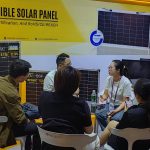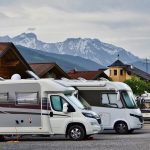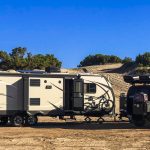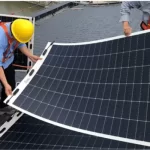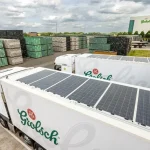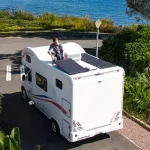Table of Contents
Currently, there is a wide range of solar panels available in the market, covering a wide range of power. When considering investing in solar panels, solar panels for 12 volt is good. Notably, 12-volt solar panels are very convenient, safe, and versatile, capable of powering different camping, marine, home, and outdoor applications. In addition, the investment-friendly price of 12-volt solar panels makes them one of the most commonly used solar panels. If you would like to learn more about 12V solar panels, please go deeper.
What is a 12v solar panels?
12V solar panels produce enough voltage to charge a 12V battery. Solar panels that produce a constant voltage of 12 or 24 volts are best suited for everyday home use. However, solar panels that produce 24 volts are more expensive and many people will consider investing in 12 volt solar panels. In order to increase the power output of a solar system without changing the voltage, 12v solar panels need to be connected in parallel.
Characteristics of 12v solar panels
Some of the important features of 12-volt photovoltaic panels are as follows:
*12v solar panel is very compact and portable. It is a convenient standalone photovoltaic panel that captures sunlight and converts solar energy into electricity.
*These are a source of green power as they generate clean and renewable electricity by utilizing solar energy.
*12-volt solar panels are efficient and convenient. They can power home appliances as well as electrical devices such as refrigerators and laptops.
*When you are camping outdoors you can power mobile devices that you carry outdoors, securing power for the user
* These solar panels are relatively effective in cooler temperatures. This is because when solar panels become highly heated, they produce less energy. Additionally, in snowy weather, the solar panels usually produce enough heat to melt the snow in them.
How to choose the right 12v solar panels
As with any solar panel, there are some important factors to consider before purchasing 12V solar panels.
- Efficiency of the solar panel
- Power Tolerance
- Low-temperature coefficient and low irradiance performance
- Warranty
- Type of solar cell
- Price
How to connect a 12v solar panel?
In parallel
Solar panels are connected in parallel using special equipment: branch connectors and converter boxes. All negative terminals are connected to one connector and all positive terminals are connected to the other connector. With this connection, the voltage of each solar panel remains the same. The amperage of all panels is added together. This type of connection increases the amperage of the entire solar power system without increasing the voltage.
In Series
When connecting solar panels in series, the negative terminal of the first solar panel is connected to the positive terminal of the next solar panel, and so on.
With this wiring method, the voltages of all panels accumulate. The amperage of the system is equal to the amperage of the panel with the minimum amperage. Therefore, it is not recommended to connect solar panels with different maximum current values in series, as they will not work effectively.
Series-Parallel Connection
This type of connection combines the first two connections. Applying this method of solar panel wiring allows you to regulate the voltage and current strength within the solar power system and its optimal mode of operation. Series-parallel connection is where the solar panels are first connected in series and then in parallel.
How to charge a 12v battery using a 12v solar panel?
To charge your 12v batteries with solar panels, you still need a charge controller. The wiring diagram below will help you understand it easily.
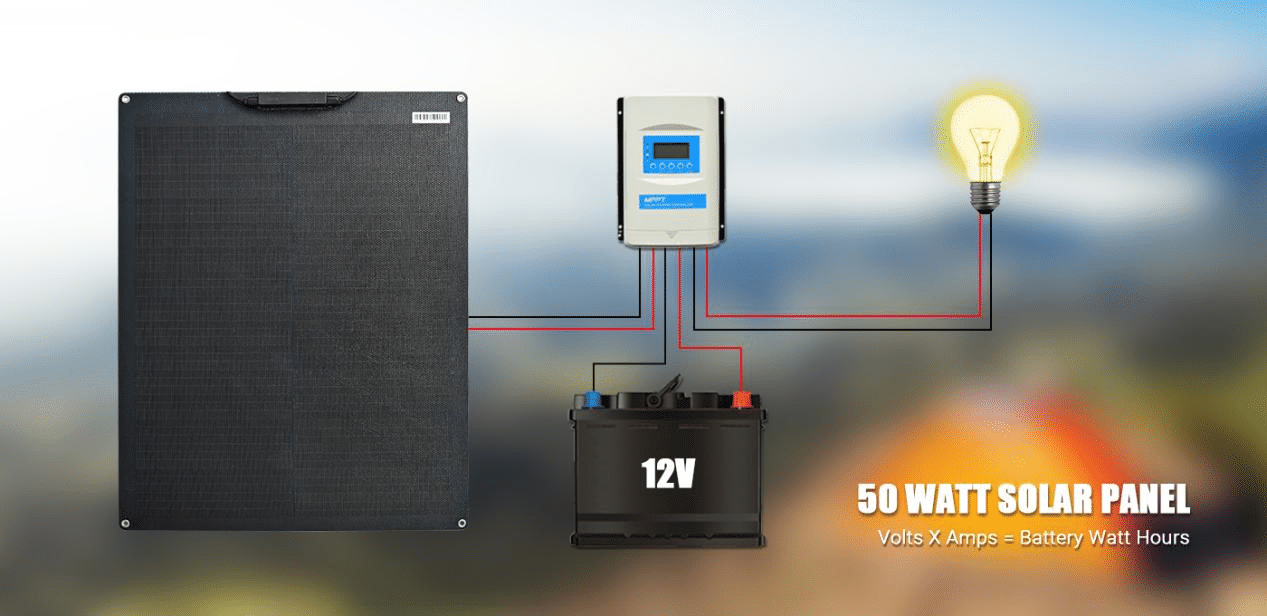
Is it possible to charge a solar battery without a charge controller? The answer is both necessary and clear: a controller, or a charge regulator, is required when using solar panels with batteries. This device is responsible for maintaining the battery’s charge and ensuring its good condition. The solar cell is responsible for storing the energy harvested from the solar panel. The larger the battery’s capacity, the more solar energy it can store. To incorporate a battery into a solar energy system, you will need solar panels, a charge controller, and an inverter
.In a home solar energy system, a solar panel battery allows you to store excess power generated by the panels instead of returning that energy to the grid. If your battery is fully charged and your panels continue to generate energy, that power is sent back to the grid
.Before connecting your solar panels to a charge controller, it’s important to understand that the controller monitors the energy stored in the battery to prevent overcharging. If the battery runs out of power, the charge controller will shut down the system. Before you can power your device, the battery must be connected to an inverter that converts the DC power collected from the solar panels into AC power
Combining solar panels for 12-volt battery systems
A 12V solar panel system, commonly used for caravans, boats, caravanning equipment, on-site communication radios, and garden accessories like pond pumps or lights, generates a 12V power output. Although a 12V solar panel system may not be sufficient to power an entire house, it is highly effective for powering small electrical and electronic equipment. The best 12V solar system setups are also flexible, portable, and very cost-effective
In a 12V solar system, sunlight is converted into DC power by the solar panels to charge a deep-cycle battery. This DC power is fed to the batteries through a solar regulator, which ensures that the batteries are properly charged and not damaged. DC appliances can be powered directly from the deep cycle battery, but AC appliances require an inverter to convert the DC power to 240 volts AC.
When a solar panel battery is used as part of a home solar energy system, you can store the excess power generated by the panels instead of returning that energy to the grid. If your battery is fully charged and your panels continue to generate energy, that power is sent back to the grid
If no single solar panel can meet your energy needs, you can combine multiple solar panels to achieve the desired wattage. For the example above, you could combine four 200-watt solar panels into an 800-watt system to exceed the required 759.52-watt output, or you could combine two 400-watt solar panels.
Difference between 12V solar panel and 24V solar panel
So, should you choose 12V or 24V solar panels? Well, there are different technical details to consider, so let’s discuss them!
-Number of Solar Cells
A 12-volt solar panel has 36 photovoltaic cells. On the other hand, a 24V panel consists of twice the number of solar cells, i.e. 72 cells.
-Applicability
A 12-volt panel is suitable for the basic needs of a small home. While 24V panels are used for large homes, flats, offices, banks, hospitals, etc.
-Battery Compatibility
Normally, 12V panels must be paired with 12V batteries and 24V panels must be paired with 24V batteries.
Of course, you can combine your actual needs to set up a higher-voltage solar module to meet your system voltage.
-Inverter Compatibility
A 12V solar panel must be paired with a 12V inverter, while a 24V solar panel must be paired with a 24V inverter.
-Charge Controller Compatibility
12V charge controllers must be paired with 12V panels. In contrast, a 24v charge controller is used with a 24v panel.
Note here that the rating of the solar panel must not be higher than the rating of the charge controller.
-Expensive
The cost of a 24V solar panel is higher than the price of a 12V solar panel due to the larger power module.
What is the best 12v solar panel for camping?
12v Portable solar panels are a great alternative to your camping solar panels, and our Sungold Ultra Slim solar panels are a great example of this. They’re ultra-lightweight and easy to carry so you can take them with you and use them with your caravan, caravan, camper trailer or other vehicle. You can also park your vehicle in the shade and run the solar panels into the sun using extension cables. They are simple to set up and only require an Anderson connection to run, making these portable solar panels easy to take to any event. When you’re done using them, you can neatly pack the 12V solar panels into a heavy-duty carry bag and hit the road.
The other main style of camping solar panels is the stationary panel. Fixed solar panels are flexible solar panels that are usually fixed to the roof of a caravan or 4×4 vehicle. The main benefit is that once they are attached they will always run and you don’t need to worry about setting them up again. However, a major disadvantage is that they are not very versatile as they are fixed in place. For starters, they are more susceptible to damage, especially from the weather, as they are fixed to the roof of your car and are not protected from the natural elements. You also can’t use the panels if you park in the shade, which many campers tend to do. Of course with the bypass diodes now built into the components, single string control or higher requirements single piece control is possible so you don’t have to worry about the island effect from shadow shading!


